A USC study shows how cycles of a fasting-mimicking diet reduce insulin resistance, liver fat, immune system aging and biological age in clinical trial patients.
Tag: Aging
Did the ancient Greeks and Romans experience Alzheimer’s?
USC’s Caleb Finch found that ancient Greeks made few mentions of anything akin to mild cognitive impairment. (Photo/Panos Karapanagiotis, iStock)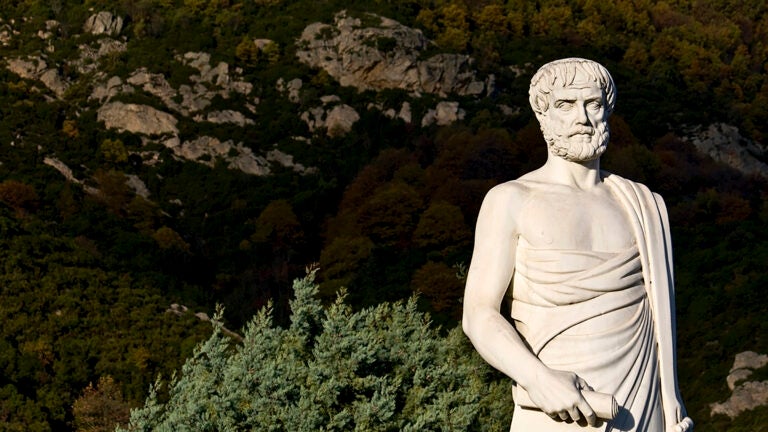
Health
Did the ancient Greeks and Romans experience Alzheimer’s?
Medical texts from 2,500 years ago rarely mention severe memory loss, suggesting today’s widespread dementia stems from modern environments and lifestyles, a new USC analysis shows.
You might think age-related dementia has been with us all along, stretching back to the ancient world.
But a new analysis of classical Greek and Roman medical texts suggests that severe memory loss — occurring at epidemic levels today — was extremely rare 2,000 to 2,500 years ago, in the time of Aristotle, Galen and Pliny the Elder.
The USC-led research, published in the Journal of Alzheimer’s Disease, bolsters the idea that Alzheimer’s disease and related dementias are diseases of modern environments and lifestyles, with sedentary behavior and exposure to air pollution largely to blame.
“The ancient Greeks had very, very few — but we found them — mentions of something that would be like mild cognitive impairment,” said first author Caleb Finch, a University Professor at the USC Leonard Davis School of Gerontology. “When we got to the Romans, and we uncovered at least four statements that suggest rare cases of advanced dementia — we can’t tell if it’s Alzheimer’s. So, there was a progression going from the ancient Greeks to the Romans.”
Do we see Alzheimer’s in history?
Ancient Greeks recognized that aging commonly brought memory issues we would recognize as mild cognitive impairment, or MCI, but nothing approaching a major loss of memory, speech and reasoning as caused by Alzheimer’s and other types of dementia.
Finch and co-author Stanley Burstein, a historian at California State University, Los Angeles, pored over a major body of ancient medical writing by Hippocrates and his followers. The text catalogs ailments of the elderly such as deafness, dizziness and digestive disorders — but makes no mention of memory loss.
Centuries later in ancient Rome, a few mentions crop up. Galen remarks that at the age of 80, some elderly begin to have difficulty learning new things. Pliny the Elder notes that the senator and famous orator Valerius Messalla Corvinus forgot his own name. Cicero prudently observed that “elderly silliness … is characteristic of irresponsible old men, but not of all old men.”
Finch speculates that as Roman cities grew denser, pollution increased, driving up cases of cognitive decline. In addition, Roman aristocrats used lead cooking vessels, lead water pipes and even added lead acetate into their wine to sweeten it — unwittingly poisoning themselves with the powerful neurotoxin.
(A few ancient writers recognized the toxicity of lead-containing material, but little progress was made in dealing with the problem until well into the 20th century. Some scholars blame lead poisoning for the fall of the Roman Empire.)
For this paper, Finch did not just think about the Roman Empire or the Greeks. In the absence of demographic data for ancient Greece and Rome, Finch turned to a surprising model for ancient aging: today’s Tsimane Amerindians, an Indigenous people of the Bolivian Amazon.
Alzheimer’s in history: Look at the Tsimane
The Tsimane — like the ancient Greeks and Romans — have a preindustrial lifestyle that is very physically active, and they have extremely low rates of dementia. An international team of cognitive researchers led by Margaret Gatz, a professor of psychology, gerontology and preventive medicine at the USC Leonard Davis School, found among older Tsimane people, only about 1% suffer from dementia. In contrast, 11% of people aged 65 and older living in the United States have dementia, according to the Alzheimer’s Association.
“The Tsimane data, which is quite deep, is very valuable,” Finch said. “This is the best-documented large population of older people that have minimal dementia, all of which indicates that the environment is a huge determinant on dementia risk. They give us a template for asking these questions.”
The paper was supported by funds from the Cure Alzheimer’s Fund and the National Institutes of Health (P01 AG055367 and R01 AG05442).
Featured Experts
Caleb E. Finch
Expert in healthy aging, human longevity, biological causes of aging, Alzheimer’s disease, molecular neurogerontology and biology, neurobiology and neurochemistry and neuroendocrinology
Margaret Gatz
Expert in Risk factors for Alzheimer’s disease, study of twins to untangle the role of genes and environment, and ways that risk can be reduced, Maintaining mental health in older adulthoodrn* risk and protective factors for Alzheimer’s disease, Twin Studies, Mental health concerns in older adults, Genetic and environmental factors affecting risk of Alzheimer’s disease and Psychological perspectives on urban social issues
Supporting the future of aging research
A new, NIH-funded program at the USC Leonard Davis School of Gerontology lets undergraduates take part in aging research.
Newly discovered genetic mutation protects against Parkinson’s Disease, offers hope for new therapies
The beneficial variant could be key to developing future pharmaceutical interventions.
Alzheimer’s diagnosis signals risk of shortened lifespan in patient’s siblings
The study found that In identical twins, when one is diagnosed with dementia, both twins have a similarly shortened life expectancy. (Photo/iStock)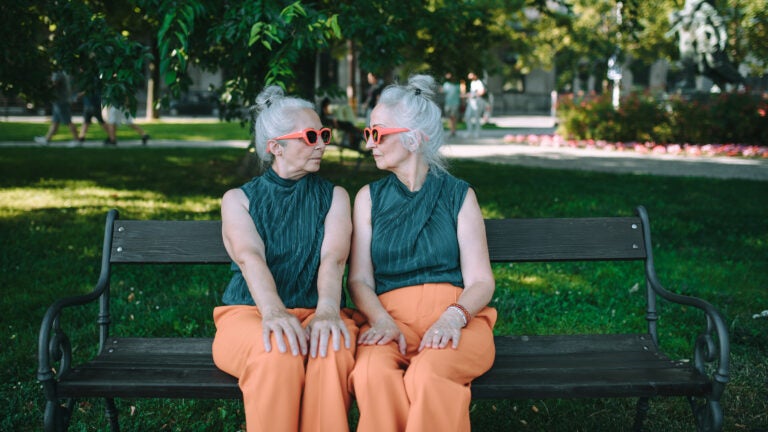
Health
Alzheimer’s diagnosis signals risk of shortened lifespan in patient’s siblings
USC and Swedish researchers find shorter lifespans among Alzheimer’s patients’ siblings, even those without the disease.
An Alzheimer’s diagnosis in a sibling raises the risk of a shortened lifespan in other family members — even those without dementia, according to new USC research based on data from the Swedish Twin Registry.
The study, published Monday in Alzheimer’s & Dementia: The Journal of the Alzheimer’s Association, suggests that the same combination of genetics and environment — nature plus nurture — that shortens longevity in someone with dementia may also shorten the life of siblings without dementia.
“We expected a different result. We expected that, in twins where one developed dementia and the other did not, the difference in lifespan would be just like we see in unrelated people,” said lead author Jung Yun Jang, who conducted the research as part of her doctoral studies in clinical science in the Department of Psychology at the USC Dornsife College of Letters, Arts and Sciences.
“We assumed the reason a person who has developed dementia has a shortened life expectancy is because the dementia leads to other medical conditions that affect mortality,” Jang said. “What we’re seeing instead is the increased risk of mortality is not due to just the dementia itself, but also a whole package of other influences that the person brings to their disease.”
In addition to Jang, other authors include Margaret Gatz, a professor of psychology, gerontology and preventive medicine at USC Dornsife; Christopher Beam, an assistant professor of psychology and gerontology at USC Dornsife; and Ida Karlsson and Nancy Pedersen of the Karolinska Institutet in Sweden.
Alzheimer’s lifespan: Longevity affected in siblings with — and without — dementia
The new study is part of Gatz and Pedersen’s landmark body of work on aging and cognition with the Swedish Twin Registry, a large cohort study of more than 45,000 Swedish twins. Across nearly 40 years, their collaborative work with twins — including genetically identical pairs — is designed to tease apart the roles of genes and environment.
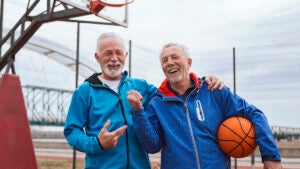
Identical twins share 100% of their genotype; fraternal twins (and full siblings) share, on average, 50% of their genotype. Most twins — identical or fraternal — generally share the same rearing environment. That environment includes such factors as early life exposures to pollution, diet, education and physical activity.
This study included 90 pairs of identical twins and 288 pairs of fraternal twins, in which one twin had dementia while the other did not.
Jang confirmed that developing dementia affects longevity in a patient, and that people live for about seven years on average after a dementia diagnosis — a finding that has been confirmed in other studies.
Other findings included:
- In identical twins, when one is diagnosed with dementia, both twins have a similarly shortened life expectancy.
- In fraternal twins, when one is diagnosed with dementia, the twin who has not developed dementia has a slightly shortened life expectancy compared to someone who has no sibling with dementia.
- The research suggests that dementia itself is not the sole cause of a shortened lifespan, but instead a combination of shared genes and environment. Both twins may develop cardiovascular disease, for example, which can contribute to dementia in one and shortened lifespans in both.
“What happens early in the life course is really important,” Gatz said. “You may not be able to change that for yourself, but it does seem like the message to parents is, make sure your kid eats healthy, make sure your kid gets exercise, make sure your kid gets an education. You’re actually contributing to giving that kid a lower chance of developing dementia 75 years later.”
Jang said she was inspired to pursue the research because “one of the most frequently asked questions when a family member receives a diagnosis of dementia is: How much time do we have?”
Jang added, “We believed that asking this question in twins would inform patients and families in making their financial and end-of-life decisions as they deal with this disease that causes losses over time.”
The work was supported by grants from the National Institutes of Health (R01 AG060470 and T32 AG000037); the Swedish Research Council for Health, Working Life and Welfare; the Strategic Research Program in Epidemiology at Karolinska Institutet; Loo and Hans Osterman’s Foundation; Foundation for Geriatric Diseases at Karolinska Institutet; and Karolinska Institutet’s Research Foundation.
Elder abuse can be prevented, USC-led study shows
A new caregiver intervention program is found to lower rates of abuse.
How old is too old to be president?
Senate Minority Leader Mitch McConnell is 81; President Joe Biden will be the same age on Nov. 20. (Photo/Patrick Semansky, The Associated Press)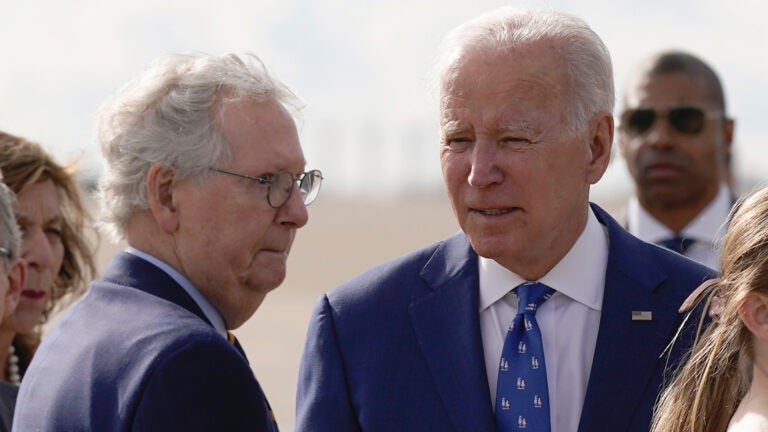
Health
How old is too old to be president?
The candidates’ ages are a concern for many ahead of the 2024 elections, but significant life experience has its advantages, USC experts say.
Suddenly, it seems like our most prominent elected officials are quite … elderly. In the next presidential election, we may be choosing between the oldest president ever (Joe Biden, who would be 82 at the start of his second term) and the second oldest (Donald Trump, who would be 78 at the start of the term). The advanced age of candidates and incumbents, and the duration of their tenure, is striking: Think Mitch McConnell, Nancy Pelosi, Mitt Romney and the late Dianne Feinstein.
There’s a reason for this, according to USC experts, and it’s a mixture of good news and bad news for our democracy.
“To get elected today, a candidate needs massive amounts of money and name recognition, both of which are hard to acquire without significant life experience,” said Kamy Akhavan, executive director of the Center for the Political Future at the USC Dornsife College of Letters, Arts and Sciences. “While there are some members of Congress who are millennials and even Gen Z, there are also freshmen Sen. John Hickenlooper, 71, and Sen. Bill Hagerty, 64. They both had many years of political and business experience before running for Senate.”
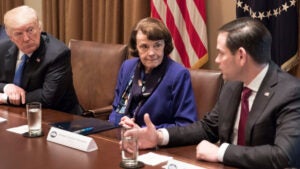
Earlier this year, the Pew Research Center released a report showing that the average age of voting U.S. House members has dropped slightly, to 57.9 since 2022, when the average age was 58.9. Meanwhile, the Senate’s average age rose to 65.3 years, up from 64.8 in 2022.
“To get more age and ideological diversity in our political pool, we need to lower the barriers to entry (money, party endorsement and name recognition) so amazing, accomplished and public service-oriented problem solvers who are not millionaires can have a chance to earn our votes,” Akhavan said.
Similarly, Dora Kingsley Vertenten, an election campaigns expert with the USC Price School of Public Policy, observes that our political system favors the “professional officeholder, who tends to be older.”
“As public life becomes more toxic in the current era, fewer quality candidates — including young and middle-aged individuals — are willing to expose themselves, or their loved ones, to the danger,” Vertenten said. “The lack of new talent running for office is a sad commentary.”
Old candidates: How old is ‘old,’ anyway?
Each time Biden trips, or McConnell “freezes,” the questions start again: Are they fit to serve? Can Biden make it through a second term?
USC experts don’t think age itself is a limitation. For one thing, a person’s “biological age” may be quite different from his or her chronological, or calendar, age.
“Biological age is more important than chronological age when evaluating a person’s cognitive and physical ability,” said Andrei Irimia, an expert on genetic and environmental factors in aging and an associate professor at the USC Leonard Davis School of Gerontology. “Persons who live healthy lives and who stay engaged with their careers in ways that they find rewarding are more likely to have biological ages younger than their chronological ages.”
Irimia’s colleague Jennifer Ailshire, an associate professor with the USC Leonard Davis School and a fellow with the USC Schaeffer Center for Health Policy & Economics, agrees. “A momentary lapse in memory or focus does not necessarily mean someone is experiencing significant cognitive decline,” she said.
“In my research, I’ve seen many older individuals start to experience physical declines in their 70s — but there are people who avoid these declines. As long as someone is up to the task, I don’t see why age should be a limiting factor in an election.”
A ‘wonderful reservoir of older adults’
Laura Mosqueda, a professor of family medicine and geriatrics at the Keck School of Medicine of USC, sees ageism at work in the idea that an elderly person might be too frail to survive a term in office.
“The glory of aging is that our depth of understanding, compassion and wisdom grows because it is based on a lifetime of experiences,” she said. “The reality is that we can go downhill fast at any age — but we prefer to live in the fantasy that it only happens to old people.
“Other societies value their elders, and it is a shame that the predominant view in the U.S. now seems to be that older adults are a step away from going downhill fast. Ageism prevents us from utilizing this wonderful reservoir of older adults who can provide guidance, particularly during these times of turmoil.”
Political campaigns expert Vertenten believes that the extensive life experience that comes with age is attractive to the electorate. When elected officials exhibit a “senior moment” in the public eye, it makes them that more appealing, Vertenten said.
“Biden’s age is easily understood by a populace concerned for their parents living longer and aging in place,” said Vertenten. “Similarly, concern among some voters about McConnell’s ‘freezing’ spells is an extension of our worries for elderly loved ones, not a reason for him to step aside. Concern for the occasional public struggle is a natural extension of our humanness.”
Fixing palliative care’s image problem could boost its use
REDIRECT
Lower-middle-class Americans near retirement are worse off than 20 years ago
REDIRECT
Helping older adults in times of extreme heat
REDIRECT